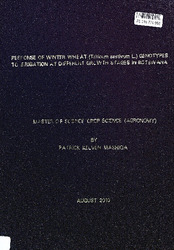Response of winter wheat (Triticum aestivum L.) genotypes to irrigation at different growth stages in Botswana
Abstract
A field experiment was conducted during 2009/2010 winter season to study the response of two winter wheat (Triticum aestivum L) cultivars (Baviaans and 14SAWYT306) to irrigation at different growth stages (from emergence to stem extension, from stem extension up to physiological maturity and throughout the growth stages). Treatments were nil irrigation (lo). irrigation up to stem extension (I1), irrigation from stem extension up to physiological maturity (I2) and irrigation throughout the growth stages (I3). Irrigation significantly increased biological yield and grain yield over nil irrigation treatments. Mean grain yield of non- irrigated crops was 1813.9 kg ha'1, while crops irrigated throughout the planting season recorded mean grain yield of 3166.7 kg ha'1. Like-wise mean biological yield for Io treatment was 3433.70 compared to 5128.30 of I3 treatment. Cultivar difference in harvest index was statistically non-significant. However cultivar 14SAWYT306 produced higher harvest index by 13.52% than Baviaans. Yield components were affected by cultivar differences. Spike length, number of spikelets per spike, number of grains per spike and number of tillers significantly differed at (P < 5%) in the two cultivars. Baviaans (265.83m2) produced higher number of tillers than cultivar 14SAWYT306 (219.83m2). Irrigating crops at all stages of growth (Ij) increased number of tillers by 29.41% compared to Io treatment. Cultivar 14SAWYT306 produced higher number of grains per spike (17.88%) compared to Baviaans. 13 treatment increased number of grains per spike by 21.60% compared to non- irrigated crop plants.
Cultivar 14SAWYT306 enhanced number of spikelets per spike with a mean of 14.97 oxer cultivar Baviaans, which recorded a mean of 12.24. Irrigation throughout the whole planting season increased number of spikelets per spikes by 23.68% for Baviaans compared to no irrigation treatment which recorded 10.83 spikelets per spike. Cultivar 14SAWYT306 recorded higher spike length mean value (9.44) than Baviaans (7.94). Water stress increased grain protein content however, the highest grain protein content (13.59%) in wheat was recorded from crops irrigated at all stages of growth. Both Baviaans and 14SAWYT306 cultivars are recommended to Botswana farmers and there is need for winter wheat to be irrigated throughout the growing period to maximize yields under Botswana conditions.
Collections
- Theses and Dissertations [133]

